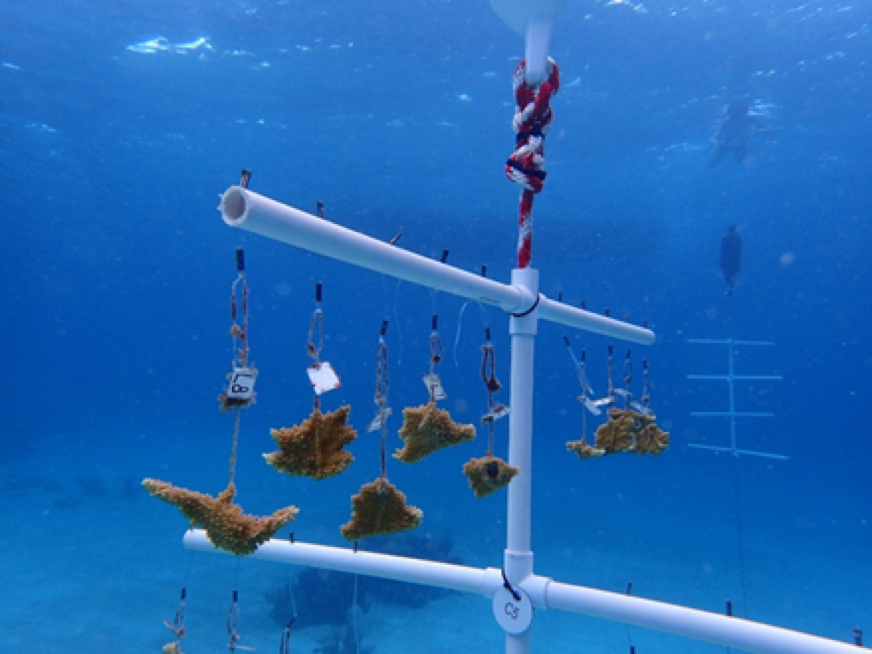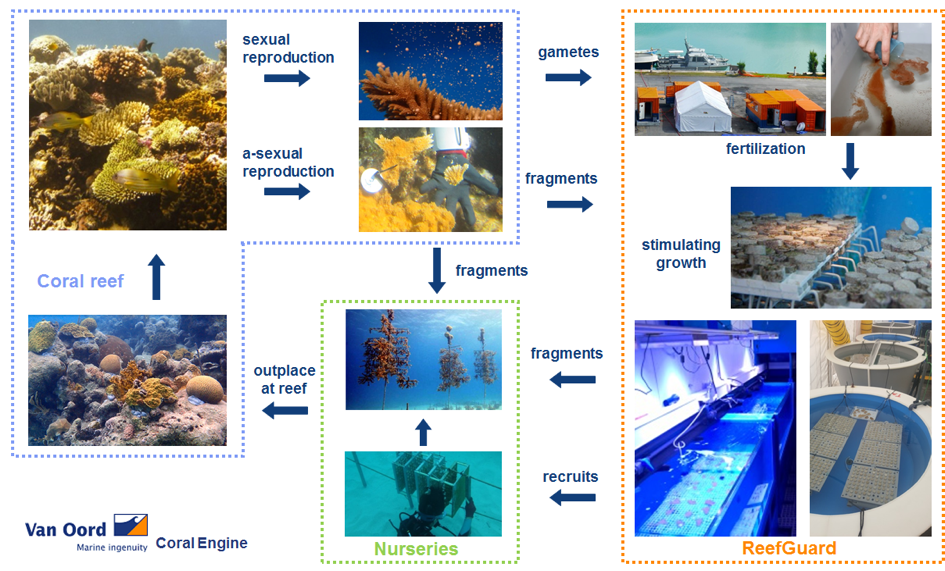Coral reef restoration - The ‘Coral Engine’: the way for local communities to manage the long term and large-scale supply of genetically diverse corals for reef rehabilitation
Remment ter Hofstede – Van Oord Dredging and Marine Contractors (Van Oord), The Netherlands
Dutch marine contractor Van Oord has achieved a major milestone in the development of environmentally-responsible maritime infrastructures with the establishment of their first large-scale underwater coral nursery (known as the ‘Coral Engine’) (Figure 1) (https://vimeo.com/vanoord/coralengine). This innovation, developed originally by Van Oord in the Bahamas, is ground-breaking in the maritime industry. The work is part of Van Oord’s Coral Rehabilitation Initiative which aims to promote active coral reef management approaches. The Initiative seeks to gain a deeper understanding of coral reef ecology in general and how they may best be protected for marine and coastal engineering development projects around the world.

Figure 1. The Coral Engine, an underwater nursery generating genetically diverse corals for reef rehabilitation
A Coral Engine is an underwater coral nursery that contains both i) locally sourced coral fragments and ii) sexually produced coral juveniles obtained from natural coral spawning events. As the corals grow, the Coral Engine provides a continuous source of out-placeable corals with which local stakeholders can create and, if necessary, restore or rehabilitate their coral reefs on the long-term. Having coral 'in stock' allows reefs to be repaired quickly following harmful events such as hurricanes.
In recent years Van Oord has been actively breeding corals using the ‘ReefGuard’ system (Figure 2) a mobile laboratory for the fertilisation, larval settlement and initial outgrowing of coral recruits at a large scale. The laboratory can be set up and operated anywhere in the world. The ReefGuard is described in detail in an online article published by the International Association of Dredging Companies (Van Koningsveld et al., 2017) (see link below). It offers controlled environmental conditions that increase the growth and survival rates of young corals significantly.

Figure 2. Coral propagation via fragmentation and sexual reproduction using Van Oord’s ‘ReefGuard’ facility.
The ReefGuard system produces thousands of coral recruits obtained from natural spawning events. These coral recruits of various ages are placed in a nursery combined with a number of coral fragments to form a ‘coral engine’. The recruits and fragments then grow into mature colonies which in time will produce a continuous supply of i) mature colonies for transplantation to rehabilitate or create reefs, ii) fragments to establish new nurseries and iii) gametes for natural reproduction during coral spawning.
The Coral Rehabilitation Initiative provides greater scientific understanding of early stage coral survival and the causal linkages between environmental conditions and coral recruitment. Corals cultured for a period of time in a laboratory under favourable conditions before placing them out on a reef were found to have higher rates of growth and survival than corals transplanted directly onto a reef. The size of coral transplants is also important to increase survival rates in the field, but culturing to an appropriate size just in the laboratory may take 2 years and is costly. The Coral Rehabilitation Initiative research therefore seeks to increase the practical understanding of optimal aquaculture growth in the laboratory and the cost effective transfer of coral recruits at a suitable size into the sea as part of the Coral Engine (Figure 1).
The Coral Rehabilitation Initiative concludes that active reef rehabilitation is a viable part of management measures for the development of marine and coastal infrastructures. The Initiative emphasised the value of the close collaboration between academic researchers, non-profit conservation organisations and marine contractors in achieving successful coral rehabilitation at a large scale and for the long-term. Pro-active solutions such as reef rehabilitation are seldom addressed by coastal managers in their environmental impact assessments and therefor rarely recommended as potential design measures. Van Oord, in common with many members of the MERCES Business Club, recommends that policy makers and environmental managers should consider and use pro-active restoration solutions in marine and coastal engineering activities. The Coral Rehabilitation Initiative with the ReefGuard and Coral Engine systems, in combination with the wider trends for sustainable solutions – such as 'Building with Nature', 'Working with Nature' and 'Engineering with Nature' - provides important management solutions for true environmental gain, thereby assisting to achieve goals of international legislative acts for the sustainable use of our marine environment.
For more information on see:
ReefGuard:
- https://vimeo.com/102004850
- van Koningsveld M, ter Hofstede R, Elzinga J, Smolders T, Schutter M, Osinga R (2017) ReefGuard: a scientific approach to active reef rehabilitation. Terra et Aqua 147, 5-16 (link: https://www.iadc-dredging.com)
Coral Engine:
For further information contact Remment ter Hofstede, Van Oord, (remment.terHofstede@vanoord.com)

